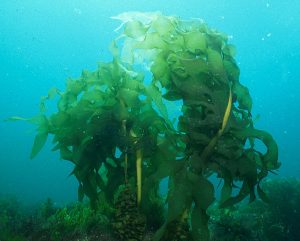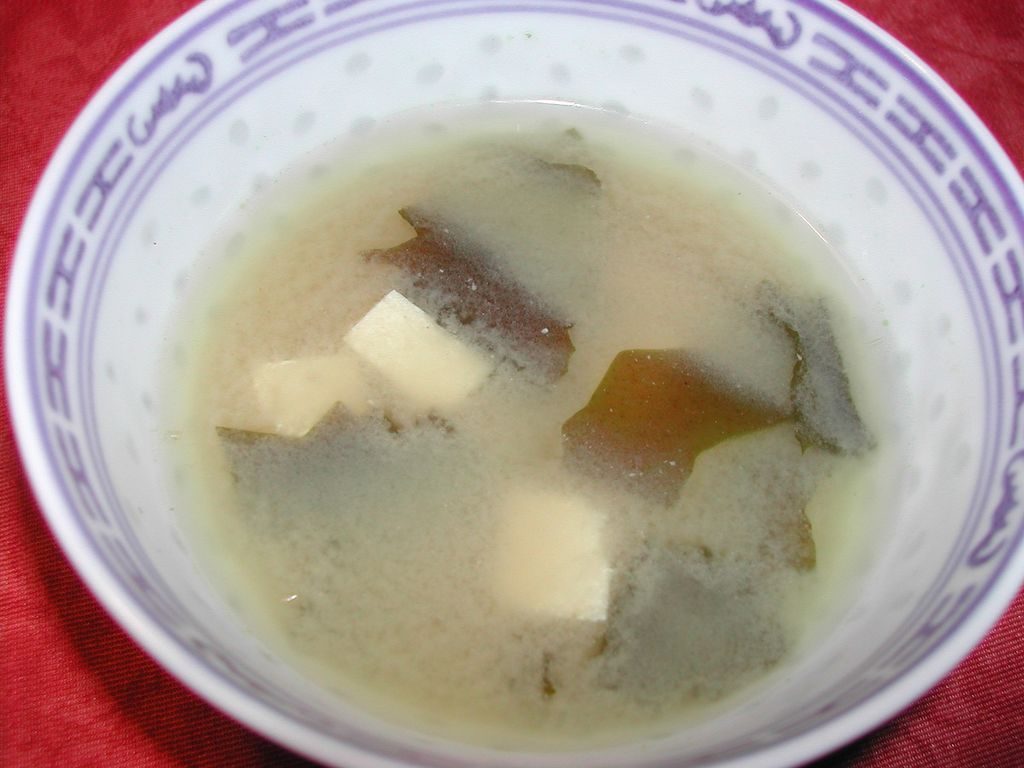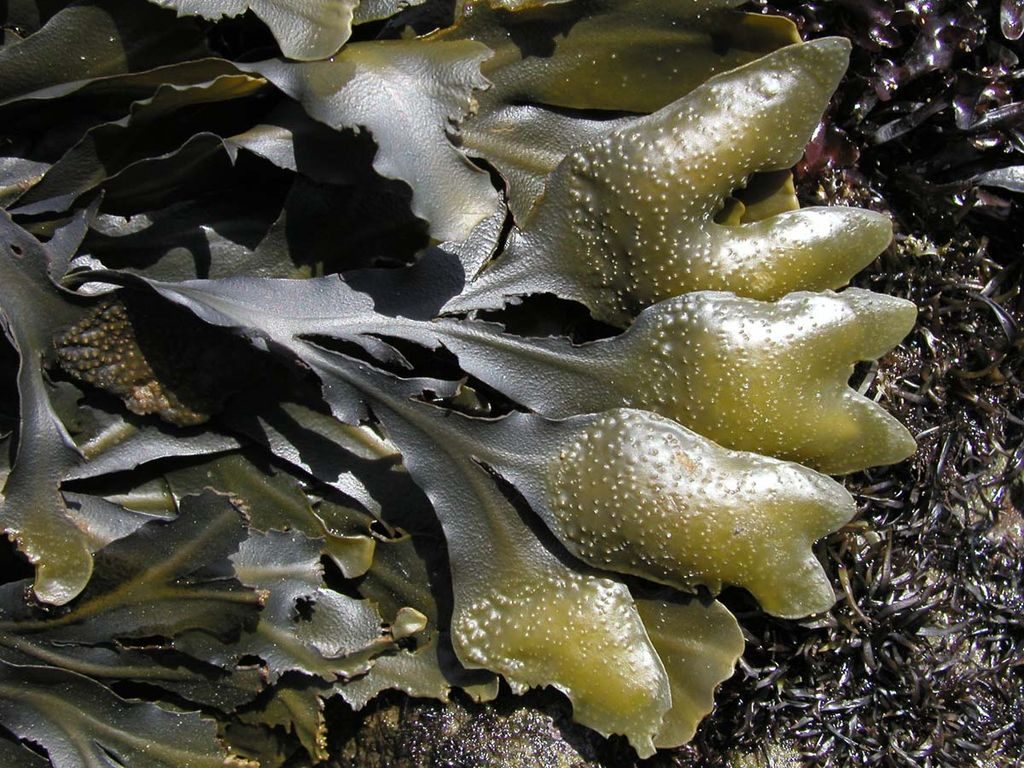Seaweed compound fucoidan may help support good health and longevity through multiple biological effects.

- Enhanced immune function. Fucoidan stimulates the immune system, making it more effective at protecting the body from illness.
- Anti-inflammatory activity. Fucoidan helps fight inflammation, which is involved in acute and chronic inflammatory conditions.
- Antioxidant activity. Fucoidan is an antioxidant, and as such can help protect the body from a wide range of health disorders.
Overview
Fucoidan is a type of compound found mainly in brown seaweed – a class of brown-colored algae that inhabit cold Northern Hemisphere oceans. The most popular seaweed sources of fucoidan are bladderwrack and three popular dietary Japanese seaweeds – mozuku, kombu, and wakame.
Seaweed consumption has been linked to good health, and is proposed to be one of the reasons for the high life expectancy of the Japanese people.1 In light of this, there has been increasing interest in the use of fucoidan and other seaweed-derived green food supplements as a way to promote overall health and longevity.
So far, two decades of medical research on fucoidan have revealed a number of beneficial properties:2
- Immunostimulatory
- Anti-inflammatory
- Antiviral
- Antioxidant
- Antilipidemic (blood-fat lowering)
Taken together, these and other less-studied effects may explain how eating seaweed can improve health and possibly even prolong your lifespan.

How Fucoidan Might Improve Your Health
It’s not yet entirely clear how fucoidan benefits human health. So far, researchers believe its major mechanisms of action are:
Immunostimulation
Fucoidan has been shown to stimulate the activity of the immune system through mechanisms including:
- Enhancing the activity of phagocytic and natural killer cells 3
- Stimulating the maturation and activity of dendritic cells via the NF-kappaB pathway 4
- Promoting the production of immune-activating cytokines such as interferon-γ and IL-12
Anti-inflammatory activity
In addition to stimulating immune system function, fucoidan has also been found to reduce both acute and chronic inflammation, which is of particular relevance for inflammatory conditions such as arthritis and colitis. Specific mechanisms through which it achieves this include:
- Blocking selectins, cell adhesion molecules that white blood cells require to move to sites of inflammation 5
- Suppression of AP-1, a protein that activates the enzyme iNOS which in turn prompts the production of nitric oxide by some cells, which can cause excessive inflammation
- Inhibition of the complement system, a part of the immune system that helps kill pathogens through inducing inflammatory responses6
- Inhibiting enzymes that may promote tissue breakdown during inflammation 7
Antiviral activity
Fucoidan has been demonstrated to counter the growth of many different viruses, including herpes and various types of influenza. It seems to inhibit the growth of viruses through two main ways: 8 9
- Preventing a virus from entering cells by blocking cell receptors
- Interfering with a virus’ replication
Antioxidant activity
Fucoidan is one of the most potent antioxidant compounds found in seaweed. Antioxidants have the potential to help with a wide range of conditions including Alzheimer’s and rheumatoid (autoimmune) arthritis. 10
Fucoidan Benefits & Uses
As a greens supplement, fucoidan is mostly taken to promote longevity and overall good health. Although such general effects are difficult to test through medical research, animal, cell culture and human studies have shown that fucoidan has many benefits:
- Boosting the immune system and fighting viruses
- Reducing inflammation
- Antioxidant activity and neuroprotection
- Stimulating lipolysis (breakdown of fat)
These effects can help with a wide range of illnesses, including Alzheimer’s, arthritis, obesity, diabetes, and inflammatory bowel disease. As such, they may add up to explain the longevity and good health attributed to the Japanese diet and seaweed consumption in particular.

Research
Animal Research
Fucoidan has been extensively studied in isolated cell cultures and in rodents. The most prominent findings indicate that fucoidan:
- May be “useful for the prevention or treatment of obesity due to its stimulatory lipolysis [breakdown of fat]”11
- Can help lower elevated blood levels of cholesterol and other lipids 12
- Boosts the immune system and has antiviral properties 13
- Helps fight acute and chronic inflammation, which is of particular relevance to arthritis and other inflammatory conditions 14
- Has potent antioxidant properties, which gives it potential to help with a wide range of conditions 15
- Holds potential for fighting Alzheimer’s and other neurodegenerative conditions, as indicated by neuroprotective effects 16
- Protects the gut from ulcers and inflammation, which may help with colitis and other inflammatory gut disorders 17 18
- May help with osteoporosis 19
Human Research
Human trials of fucoidan have only just begun. So far, they seem to confirm the two major benefits of fucoidan highlighted by animal research – stimulation of the immune system, and reduction of inflammation.
Fucoidan-rich supplement may help with osteoarthritis
This randomized study examined the efficacy of Maritech, a fucoidan-rich supplement that also contains vitamin B6, zinc, and manganese. Nineteen adults with knee osteoarthritis were given 100 or 1000 mg of the supplement daily for 12 weeks. Patients on the 100 mg dose saw an 18 % improvement on a measurement scale of arthritis, while the 1000 mg group saw a 52% improvement.
- The researchers concluded that “The seaweed extract nutrient complex when taken orally over twelve weeks decreased the symptoms of osteoarthritis in a dose-dependent manner.”20
Fucoidan-rich supplement may stimulate the immune system and reduce inflammation
This follow-up study tested the effects of the Maritech fucoidan supplement on immune function. Ten healthy adults were given 100 and 1000 mg doses daily for 4 weeks. The supplementation was associated with enhancement of certain parts of the immune system – such as the activity of phagocytic cells and numbers of cytotoxic T-cells – as well as reduction of inflammation, as highlighted by reduced levels of the IL-6 cytokine.
- The researchers concluded that “The seaweed nutrient complex was safe to use when taken orally over 4 weeks. The preparation was demonstrated to have potential as an immune modulator.” 21
Fucoidan (300 mg) may stimulate immunity in the elderly
This randomized, placebo-controlled, double-blind study examined whether fucoidan can help enhance the immune response in the elderly. A total of 70 people (aged 60+) were given placebo or fucoidan (300 mg, derived from the Japanese dietary seaweed Mekabu) daily for 4 weeks, and were then given the flu vaccine. The fucoidan group had higher numbers of antibodies, had improved immune response to the vaccine, and improved natural killer cell activity.
- The researchers concluded that “It is hoped that the popular seaweeds eaten daily in Japan…will be consumed outside Japan for possible immunopotentiation and for attenuating the burden of infectious diseases in the elderly.” 22
Dosage for Immunity
- Doses of 100 – 1000 mg have been used, but there is no established dosage of fucoidan in research due to differences in fucoidan source and preparation
- Supplements typically supply 300 – 500 mg doses of fucoidan powder
Available Form
- Brown seaweed extract. The most common form, sometimes standardized to contain a certain amount of fucoidan.
- Maritech®. A branded form of fucoidan that has shown efficacy in two human studies. Maritech supplies 88.5 mg of fucoidan per capsule, the amount estimated to match the daily fucoidan intake of Japanese people.
- Fucoidan is sometimes combined with AHCC – a mushroom-derived compound with similar immunostimulatory properties.
Supplements in Review Says
- Fucoidan as Maritech® 926, 88.5 mg.
Fucoidan appears to have a wide variety of benefits. Although more human studies are needed to back its effects, current research suggests that fucoidan can benefit overall health in many ways.
We recommend Maritech, the most researched fucoidan supplement. The efficacy of maritech fucoidan is backed by two clinical studies, making it the most trusted form of fucoidan at this time.
Leave a Reply